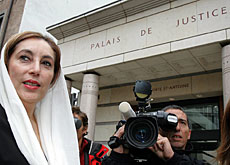
Amnesty spells trouble for Swiss Bhutto case

The former Pakistani prime minister, Benazir Bhutto, may avoid a money-laundering trial in Switzerland thanks to a new corruption amnesty at home.
A “reconciliation ordinance” issued by the Pakistani government last week grants across-the-board immunity for politicians who were active between 1988 and 1999.
Daniel Zappelli, the general prosecutor of Geneva, is facing a quandary. Should the politician and her husband stand trial now that Bhutto has been granted an amnesty by her own country?
The couple were accused of receiving multi-million dollar kickbacks in exchange for handing out a contract to a Swiss firm during Bhutto’s second term in office between 1993 and 1996.
The couple were first convicted of simple money laundering in 2003 by a Geneva investigating judge who handed down a six-month suspended sentence. The Bhuttos appealed against the magistrate’s decision but were later accused of more serious money laundering offences.
Most observers agree the amnesty signed by Pakistan President Pervez Musharraf was part of pre-election horse-trading. It paves the way for a power-sharing deal between the two politicians, which could see long-exiled Bhutto move back into the prime minister’s job next year.
Cases “withdrawn”
The Pakistani minister for law affairs, Zahid Hamid, said in Islamabad last week that five corruption cases were still pending against Benazir Bhutto abroad while six cases were pending against her husband Asif Zardari.
Hamid added that corruption cases against the couple pending in foreign courts would be dropped.
“Any case against any holder of the public office registered before October 1999 and still pending with the courts would be withdrawn under the ordinance,” Hamid explained.
However Dominique Henchoz, the lawyer representing the Pakistani government in Geneva said it was still not clear whether legal action would be stopped.
“We’ll have to wait to examine the exact wording used in the decree,” he added. “Because surely to speak of an amnesty implies that there has been an act of corruption?”
An official at the Pakistani embassy in Bern declined to comment on the case when contacted by swissinfo, saying that it was being handled directly from Islamabad.
Frozen accounts
The case, opened in 1998, involved the Geneva-based Société Générale de Surveillance (SGS), the world’s biggest verification, testing and certification services group.
The three investigating judges in Geneva who have dealt with the file for a decade found that Bhutto and her husband received $12 million (SFr14.25 million) in Swiss bank accounts belonging to companies registered in the Virgin Islands and Panama.
Assets belonging to the Bhuttos were frozen following an official Pakistani request in 1997. Following the amnesty, it is not clear who will claim these funds.
Vincent Fournier, one of the three judges, has confirmed his office is about to pass on the case to the prosecutor.
“It is surprising to note that for ten years Pakistan has constantly pushed us to see that justice be done. And now, in the light of a change of political allegiance, Madame Bhutto benefits from an amnesty,” Fournier pointed out.
Bhutto’s lawyer Alec Raymond believes the situation is now crystal clear. From the moment where there is no prior crime, “there cannot be money laundering. We are heading for the end of the Geneva procedure,” he told swissinfo.
Meanwhile Bhutto is preparing for her homecoming after eight years of exile. She is scheduled to return to Pakistan on October 18. Her husband will remain in Dubai.
swissinfo
1994 – SGS and Cotecna sign contracts with Pakistan.
1997 – Pakistan asks Switzerland for legal assistance.
1998 – Bhutto and her husband charged in Pakistan and Switzerland.
1999 – The couple are sentenced to five years prison by a Lahore tribunal.
2001 – The Pakistan Supreme Court rejects the judgement.
2004 – The couple is charged with advanced money laundering.
2007 – Benazir Bhutto benefits from a corruption amnesty in Pakistan.
Pervez Musharraf, who has just been re-elected president of Pakistan, signed a decree last Friday that opens the door to a power-sharing agreement with the exiled former prime minister Benazir Bhutto.
Bhutto could be back in the job thanks to the alliance of her party with Musharraf’s ahead of the general election early next year.
Bhutto, daughter of another former prime minister, Ali Bhutto, comes from a very rich family in the province of Sind. Her father was hanged by the military in 1979.
She was prime minister twice, from 1988 to 1990 and from 1993 to 1996. She was the first woman to lead this Muslim country with a population of 160 million.

In compliance with the JTI standards
More: SWI swissinfo.ch certified by the Journalism Trust Initiative





























You can find an overview of ongoing debates with our journalists here . Please join us!
If you want to start a conversation about a topic raised in this article or want to report factual errors, email us at english@swissinfo.ch.